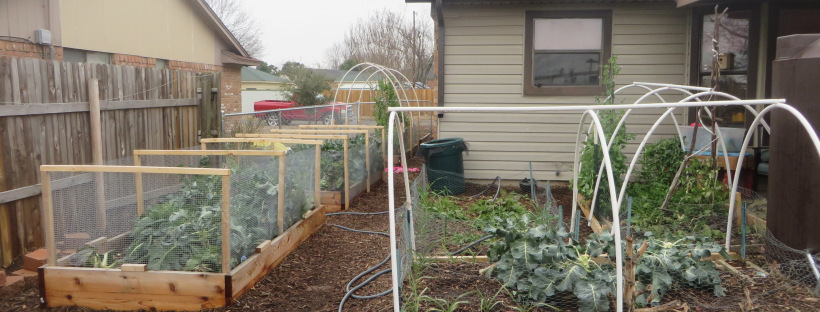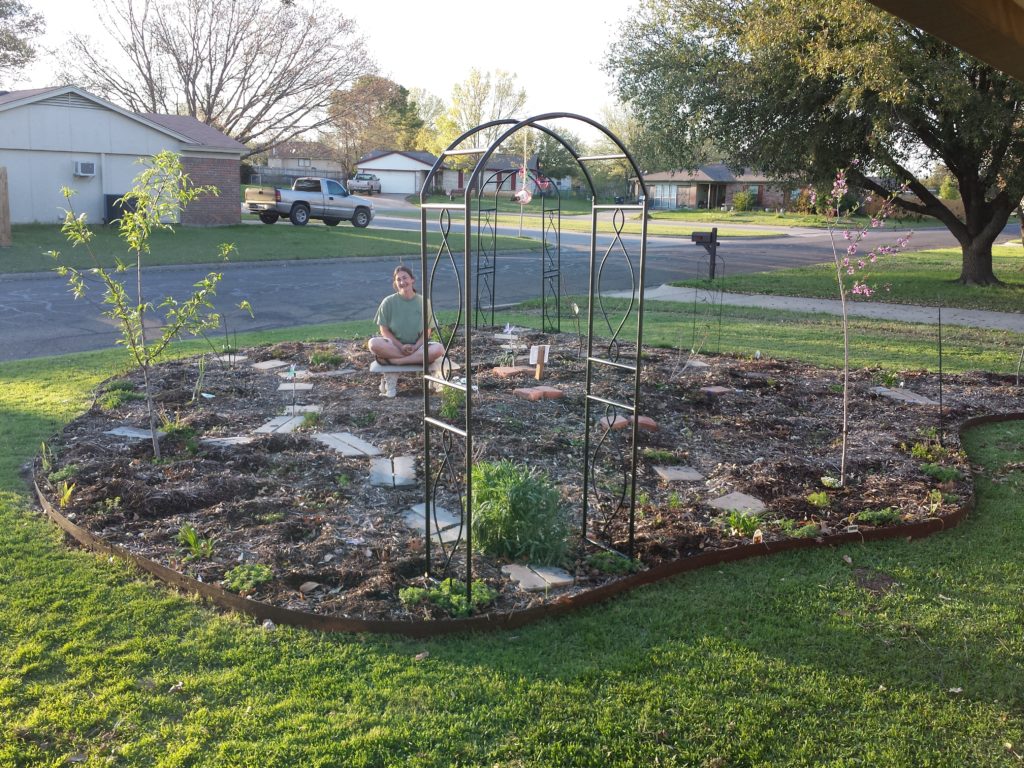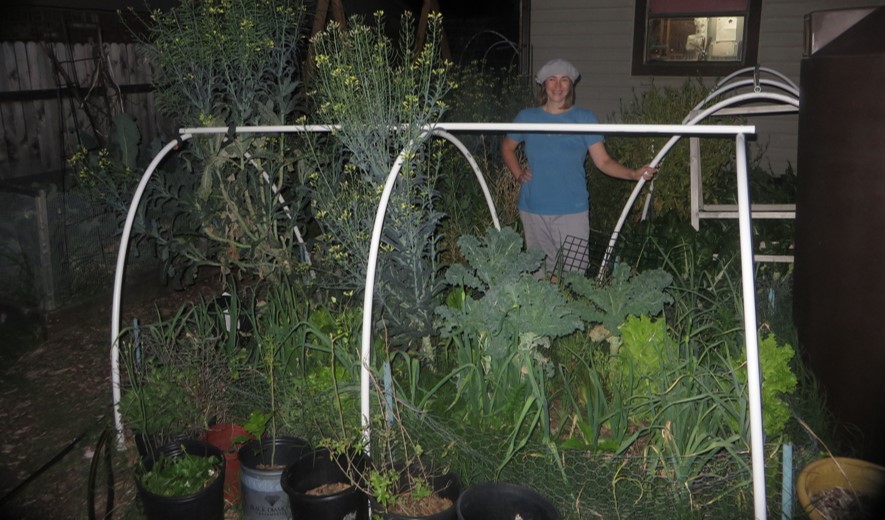Featured Farmer:
Lori from Rose-Xanadu
Editor’s Note: Lori was recently on The Urban Farm Podcast! Listen to our interview with Lori here.
Tell me a little about your urban farm. What’s its name? Size?
I call my urban farm Rose-Xanadu, because it’s my little slice of joy and pleasure. It was created on my 0.17 acre suburban lot after plans to move to land fell through and I decided I could just grow where I was planted!
What are you growing?
An easier question would be, “What am I NOT growing?” I grow veggies, fruits, and herbs of every shape, size, and color. On my 0.17 acres, I have:
- 12 fruit trees (fig, peach, pear, apricot, plum, cherry, and persimmon),
- medicinal herb trees (linden, hawthorne, elderberry, toothache tree),
- fruit bushes (blackberry and blueberry),
- medicinal herb bushes (rose, rosemary, lavender, sage, chives),
- perennial veggies (asparagus, artichokes, walking onions, horseradish),
- annual fruits and veggies (tomatoes, cucumbers, okra, corn, green beans, black-eyed peas, sweet peas, kale, chard, melons, squash, lettuce, Malabar spinach, peppers, broccoli, cauliflower, cabbage, onions, garlic, carrots, beets, turnips, radishes, mustard greens, turnip greens, collard greens),
- other medicinal herbs (mints, oregano, thyme, mullein, passionvine, chamomile, violet, evening primrose, comfrey, anise hyssop, tulsi, hibiscus, catnip, moringa, lemon balm, dill, fennel, lemon verbena, echinacea, hyssop, yarrow, nettles, burdock, marshmallow, calendula, Spilanthes, poke, Mexican mint marigold, plantain, cactus, milkweed), and
- native butterfly and hummingbird plants (mostly edible, of course).

What kind of climate are you growing in?
I live in the unique climate of North Central Texas. People who move here from other states and regions say there is no other growing region like this, and that this is the most challenging. I don’t know if that’s true, but I do know that while people are jealous when my growing season starts in February, I am jealous of their August harvest when everything in my yard is dead.
What initially got you interested in urban farming?
Trust issues. I say this with humor, but it is true. I have always been called to be a steward of the earth, and once I learned about the impact of the conventional food system on the planet and my body I turned to support local farmers. What I found, unfortunately, is that farmers that don’t use any pesticides and herbicides were very hard to come by, and many had learned to just say yes when asked if they grew organically. I decided that the best way to ensure my food met my standards was to grow it myself.
Another reason I began to train myself on intense urban farming was my co-occurring passion for problem-based learning in my college biology classroom. I had a unit where students created how-to brochures for a then-pretend community garden. After a few semesters of students expressing disappointment that there was no real garden, I decided I could make it real. I have since developed a partnership between my college and the local ISD where my students build school gardens each semester with students from one local elementary school. As I write this, I have had to expand to other ISDs because all of the schools in my community now have a garden!

Do you use any organic, permaculture, hydroponic, biodynamic, or other methods? Explain.
I use 100% organic methods, and I tend to go beyond organic by not using even organic means of pest control but rather relying on natural processes and ecosystem dynamics to sustain my garden. I employ permaculture principals of planting polyculture, multi-functioning raised beds with plants adapted to my region in fertile soil in the right seasons. I invite predatory bugs (that would also be killed with organic pest control) to do my bug killing, much to the shock of visitors who find out the paper wasp nests are actually allies!
Do you use compost? Where do you get it and how does it help your plants?
While my current yard (cough cough, husband) doesn’t allow for outdoor composting, I have multiple worm bins indoors where I cultivate worm castings. This allows me to do something with at least a bit of my food scraps, and provides enough worm castings for seasonal application and worm compost tea as often as I can dedicate myself to making.
Do you have any urban livestock? Chickens? Bees?
Our city has rules against bees and livestock, but we are allowed to have hens. However, although I feel like our yard has space for chickens, my husband and I have to share the yard and his favorite landscape is grass (*shudder*). So, in an effort to leave him with a little bit of sanity, I acquiesce to his denial of my adding chickens to my shenanigans. However, we are looking to upgrade our yard slightly so that he can have the grassy knolls he wants and I can pursue raising goats, pigs, and chickens!!

What do you do with the food you grow?
Eat it, ferment it, can it, share it, and sell it, in that order. I once sold my seeds and veggies at the farmer’s market, and even had a deal with a local CSA farm to trade my veggies for meat (that was awesome!), but that kind of structured demand didn’t really fit with my “I like to garden what I want when I want” mindset. I prefer to have people come to my yard as a “pick your own” when selling my produce. Mostly, however, I like to eat what I spend half a year growing. It’s very difficult for me to sell a tomato that I have been growing from seed since January for what feels like mere pennies. I don’t know how local farmers do it! I much prefer to let that food create my body cells so that it stays with me forever.
What is your greatest challenge in your farming endeavors?
Honestly, I get bored once I figure out how to do something. I think this is why we are finally taking the plunge to get a bit more land and learn how to raise livestock and chickens: I need a new challenge! And while I am not scared of wasps, I do get super itchy when most leaves touch my skin, and aphids tend to love eating me. So, maintenance in my efforts is my biggest challenge, which is true in all aspects of my life, not just gardening.

What do you enjoy the most about farming/growing food?
I think most people love the harvest most, but I love watching the seeds pop up out of the ground. There is something truly miraculous in watching this seemingly inanimate object spring to life with just a few environmental requirements being met. And then of course when that tiny seed turns into so much food that you eventually give up harvesting it….how incredible nature is! And just the thought that when I eat this fruit that used to be this seed, those nutrients now literally turn into my body. Wow! Ok, so maybe it isn’t just watching the seeds pop up that I enjoy most! It’s the brilliant perfection of the circle of life that I get to witness again and again, season after season, as I cultivate the future of my body in my yard.
Why do you think urban farming is important?
Urban farming is crucial to the sustainability of our species. Our current food system is destroying the planet and our health, and until we re-harness the knowledge that our great grandparents had we will continue to decline. The disconnect from our food and medicine is not only causing physical health issues nutritionally, but our lack of sun and green time, as well as our spiritual disconnect from the life force and creator culminate into the epidemic of mental and physical health issues in our culture.
Do you think this is a growing movement?
Luckily, my generation is beginning to see the obvious necessity of reconnecting with our food and medicine, even by growing just one or two things on your apartment balcony. This movement is growing slowly, and eventually those who know how to feed themselves locally will have an advantage as our global environment starts to decline.
Is urban farming the future of agriculture?
Backyard farming was the CREATION of agriculture. We just strayed a little bit outside of the lines in the name of productivity and money. I think we are all starting to color a little bit better, and eventually the pictures will all be beautiful again, either by our own will or by the earth’s eventual demand that we get back to our roots.
Do you have any advice for someone that’s just getting started?
You don’t have to plant ALL the things right at first. Start with your favorite veggie and grow it from seed to harvest, to seed again. If you don’t have a yard, grab a pot! And don’t reinvent the wheel…the great thing about gardening is that the knowledge is there; we just have to seek it!
Anything else you’d like to add?
Don’t get down if you stray from your garden from time to time. Everything has its seasons, and even the plants take a break from year to year. But don’t forget to come back, and don’t forget to have fun!







Lori, thanks for sharing what you do. I am fairly new to gardening and I would like to learn more about polyculture planting? Are there are resources or websites you recommend where I could learn how to implement this type of planting?